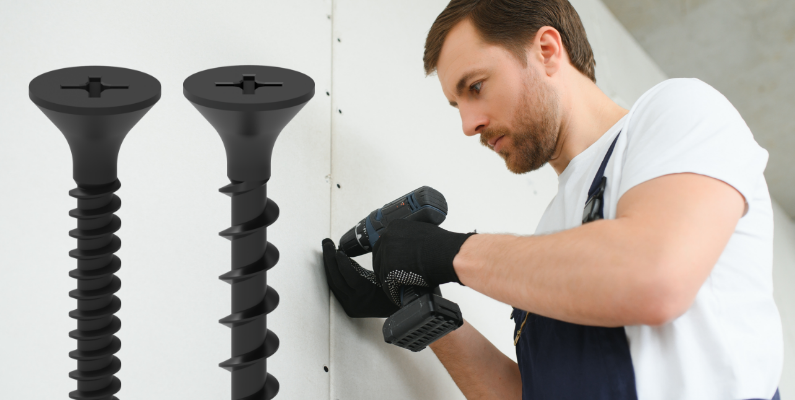
What are the correct screws for drywall?
Navigating the Labyrinth of Drywall Screws: Making the Right Choice
Drywall screws might appear inconspicuous amidst the chaos of construction materials, but make no mistake – they're the unsung heroes of securely hanging pictures, mounting shelves, and erecting drywall sheets. Yet, within this seemingly simple category, a divide emerges: the S-type and W-type drywall screws. These two types carry distinct attributes that can make or break your DIY project. Let's demystify the realm of drywall screws, unraveling their intricacies for a confident choice.
Mastering the Basics
Drywall screws have risen as the go-to fastener for attaching drywall sheets to wall studs or ceiling joists. Their lengths, gauges, thread types, heads, points, and composition initially might leave you scratching your head, but fear not – within the realm of DIY home improvement, the seemingly overwhelming array of choices condenses into a handful of well-defined picks, tailored to common homeowner needs. To decipher this code, focus on the three primary features: drywall screw length, gauge, and thread.
Decoding Drywall Screw Lengths
The saga begins with length – a vital determinant that hinges on the thickness of your drywall. Let's break it down:
- 1/4-inch drywall: Opt for 1- to 1 1/4-inch drywall screws.
- 1/2-inch drywall: Choose between 1 1/4-inch or 1 5/8-inch drywall screws.
- 5/8-inch drywall: Embrace 1 5/8-inch or 2-inch drywall screws.

Unlike the vast spectrum of sizes found in construction screws, drywall's thickness varies only minimally. Most residential drywall clocks in at 1/2-inch thickness. Type-X drywall at 5/8-inch thickness steps in for fire code compliance or areas near furnace rooms. While 1/4-inch drywall's flexibility makes it suitable for curves, the majority of DIY projects – kitchens, bathrooms, and common areas – feature 1/2-inch thick drywall.
S or W: A Threaded Tale
Drywall screw threads introduce us to a tale of two types: coarse and fine.
Coarse Thread Drywall Screws (W-Type): These champions are a match made in heaven for wood studs. The wide threads deftly grip wood, tugging the drywall towards the studs for unwavering support. Beware, though – these coarse-thread screws might embed metal burrs into your fingers, so don your gloves when dealing with them.
Fine Thread Drywall Screws (S-Type): Sharp-pointed and self-threading, these screws are tailor-made for metal studs. Their ability to self-thread makes them the ideal choice for drywall installation on metal studs. The fine threads work harmoniously with metal surfaces, eliminating the need for excessive drilling.
Gauge: The Diameter Dilemma
Gauge, the diameter of the drywall screw, comes into play next. Most projects involve #6 or #8 drywall screws. Keep in mind that higher gauge numbers correspond to larger diameters. Unlike other construction materials, where lower numbers indicate coarser textures, drywall screws defy the norm.
Unraveling the Uses
Drywall screws' main mission revolves around anchoring full or partial drywall sheets to wood or metal studs. They're also the heroes that remedy nail pops – those pesky circular bumps that appear on walls due to nails.
While drywall screws are hailed for their prowess in drywall installation, some adventurous souls test their mettle in unintended areas like building projects. While drywall screws boast affordability, excellent grip, and abundance, their brittleness in comparison to wood screws poses a challenge. They might snap or break, leaving an unwelcome mess behind.
Finding the Right Fit
For most DIYers working with 1/2-inch drywall on wood studs, the trusty 1 1/4-inch or 1 5/8-inch coarse-thread drywall screws are the champions. These screws offer reliability and affordability, despite the minor challenge of sinking the longer 1 5/8-inch screws completely. For ceiling applications, longer screws are ideal, while wall installations can accommodate either option.
Driving Like a Pro
Drywall screw driving doesn't demand a dedicated screwgun – your trusty cordless drill with adjustable torque settings and a clutch will suffice. Remember to pierce the drywall paper, allow the screw to self-feed, and sink the screw without tearing the paper.
In Conclusion
As you journey through the labyrinth of drywall screws, armed with knowledge, you can confidently tackle any installation project. Embrace the S-type and W-type screws for their distinct strengths, and choose the right length, gauge, and thread type for the job at hand. With drywall screws as your steadfast companions, you're poised to create sturdy, reliable installations that withstand the test of time and gravity.






